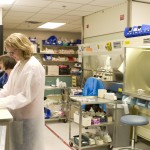For adult organ transplant recipients, juggling a lifetime regimen of immunosuppressant drugs is difficult enough, but for children it presents an even greater challenge. These drugs, which also can have toxic side effects, must strike a delicate balance between preventing organ rejection and protecting from infections.
But children’s immune systems are still “learning†what distinguishes them from the world around them, and children are constantly developing and changing, both physically and emotionally. This puts them at greater risk for complications either through inappropriate medication or failure to take these drugs properly.
A grant from the National Institute of Allergy and Infectious Diseases (NIAID), through the American Recovery and Reinvestment Act (ARRA), will support new studies at Emory University and Children’s Healthcare of Atlanta to help clinicians tailor therapies specifically for children receiving transplants. The project will include hiring of additional personnel to undertake these studies.
Allan D. Kirk, MD, PhD, is principal investigator of the project, which is supported by a two-year grant of nearly $1.65 million. Kirk is professor of surgery and pediatrics in Emory University School of Medicine and a Georgia Research Alliance Eminent Scholar. He also is vice chair of research in the Department of Surgery and scientific director of the Emory Transplant Center.
The ARRA-funded project will not only help determine which medications children should take, but also will give them the support to care for their transplanted organs. The Emory scientists are studying new biological monitoring technologies that can identify unique ways to determine exactly how much medication a child really needs. These studies are being combined with a novel transition care clinic specializing in helping children cope with their illness and assuming responsibility for their care.
“This award indicates exceptional insight by the NIAID into the critical link between a child’s physical well-being and their emotional maturity,†says Kirk. “It will accelerate progress in this vital area of research for a very deserving subset of chronically ill children.â€





 The
The 
